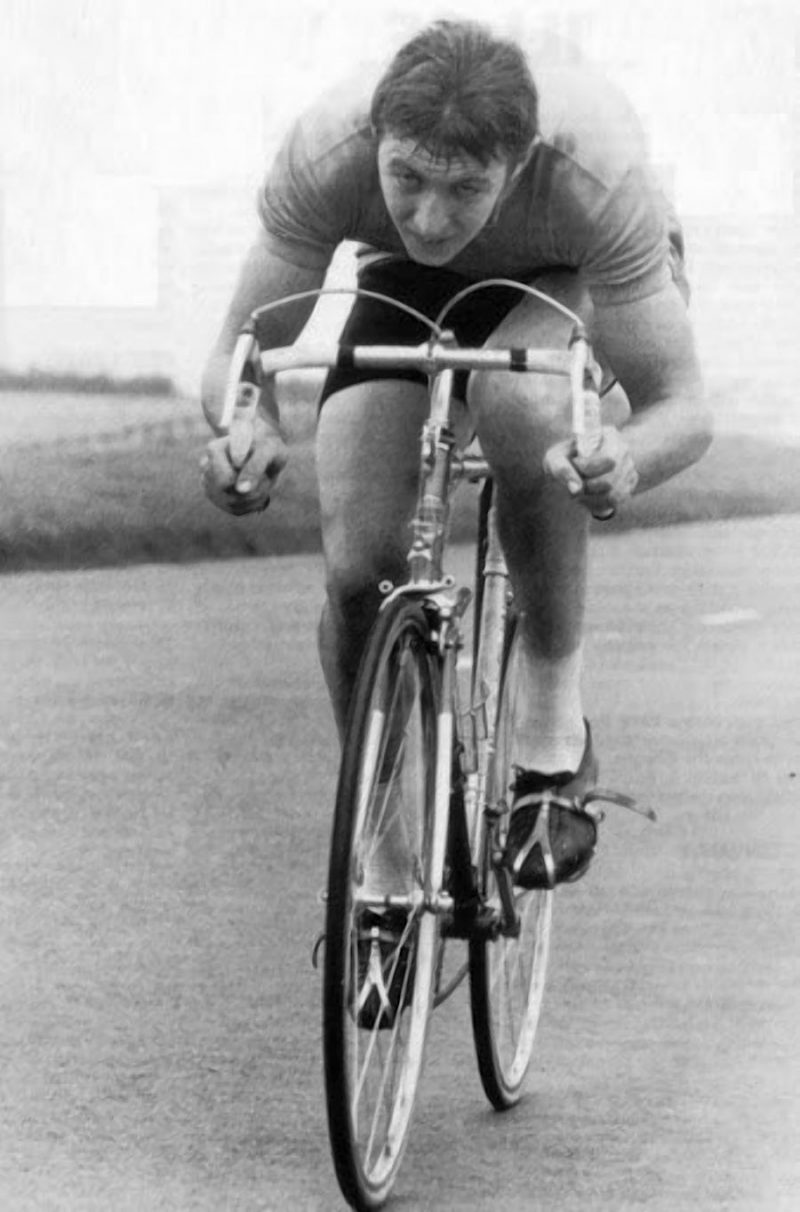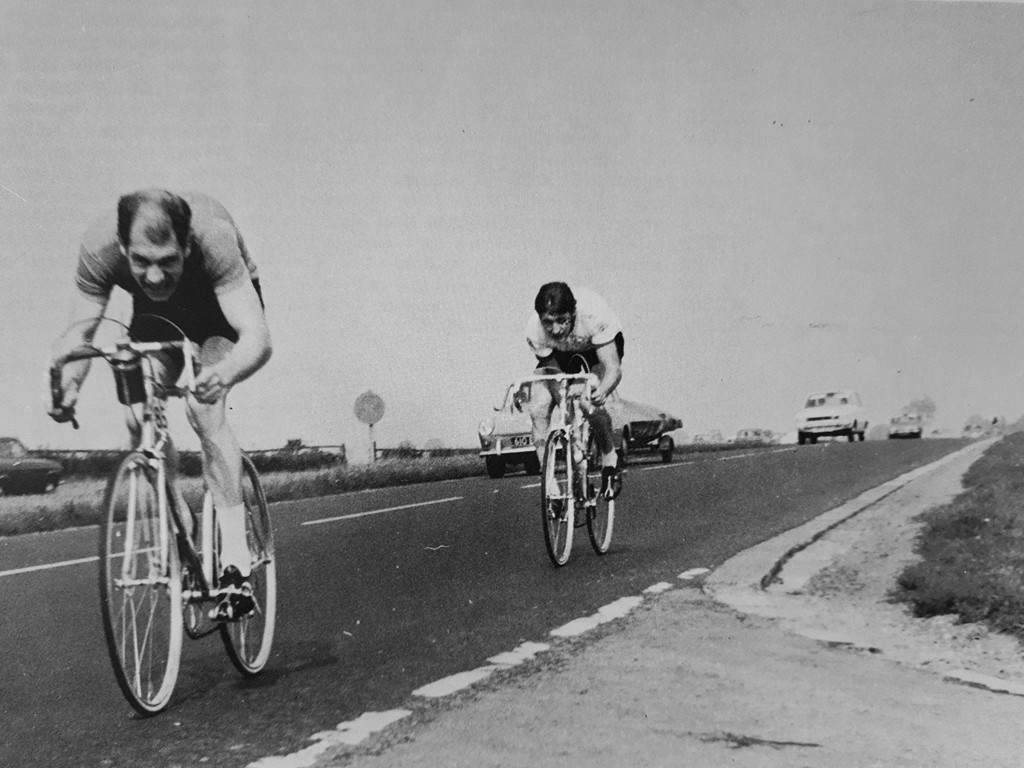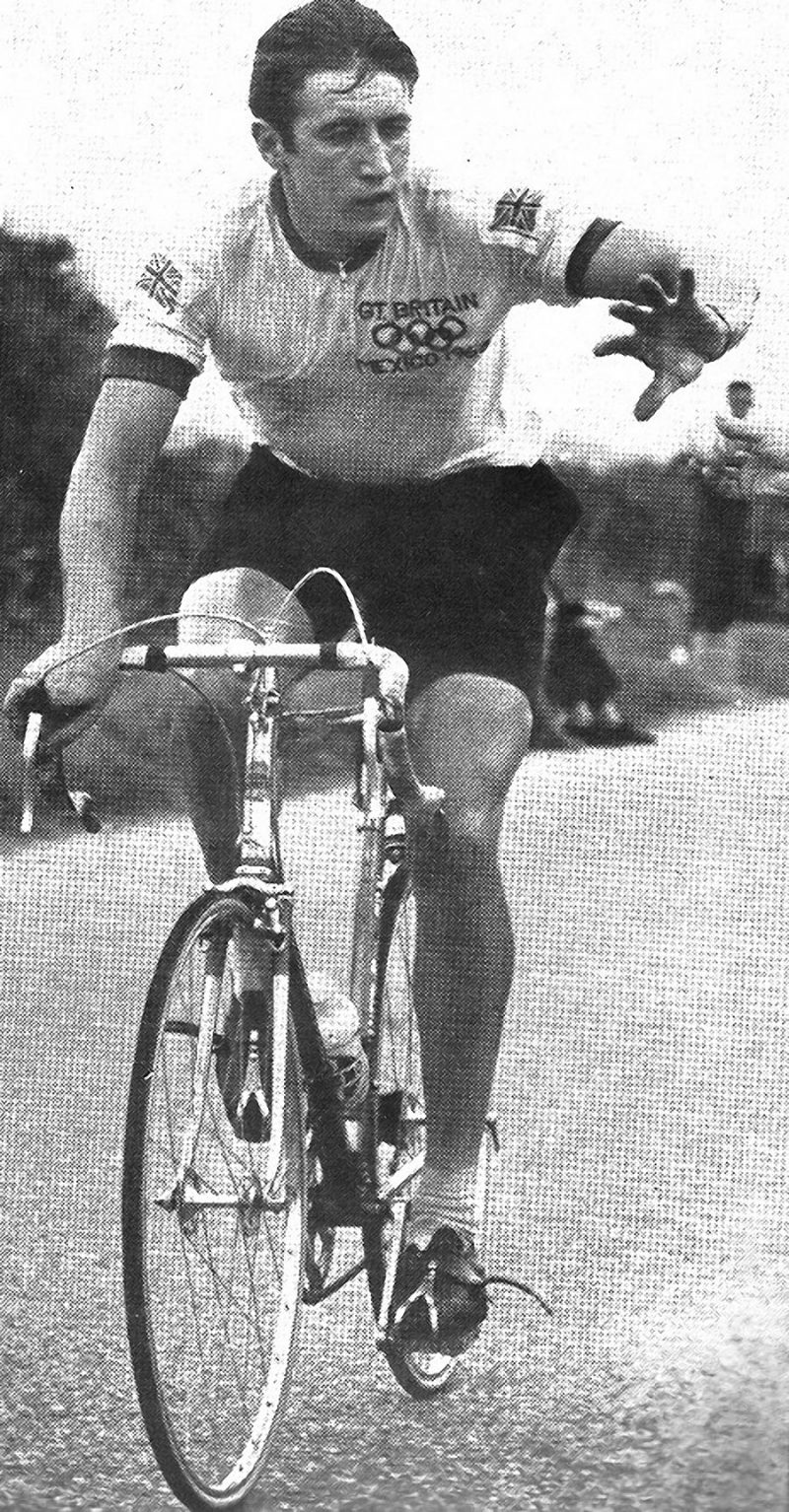John Watson started racing at 18 years-of-age in 1966, his first race was a ‘25’ which he won with a 1:00. By the following year he was National ‘100’ Champion; in 1968 he went to the Mexico Olympics; in 1969 he set a 12 hour record which stood for a decade; 1970 saw him set a ‘50’ record which sliced nearly four minutes of the previous fastest time for the distance and lasted for 13 years, win the BBAR, get fourth place in the prestigious GP de France time trial and get offered a place with ACBB.
Then he quit, aged just 23 years – Mr. John Watson, time trial legend.
How did you get into the sport, John?
“I began racing very late, I was 18 years-old.
“My mum and dad were both cyclists so I knew that one day I’d get into the sport but I was good at cricket and rugby as a youngster.
“I played rugby at a good level and the team wanted me to go on with them but it’s a sport where you get a lot of injuries and in August 1965 I went out on my first ride with the Clifton CC on a Tuesday evening, I was hooked.
“The Clifton had a great bunch of guys, Tony Boswell, Ian White and the late Pete Smith who was three years older than me and became my training partner and life-long friend.”
What about the grass-eating story, John.
“That was in the early days, my parents went on holiday about 70 miles from home and I decided I would ride there.
“I got ‘the knock’ really badly, I went searching for berries, couldn’t find any and ended up eating grass – I have to tell you that it has no nutritional value for a human!”

Your first race?
“I trained hard with the Clifton over the winter of ‘65/’66, I was already a decent athlete but those Clifton training runs were tough, however they prepared me well for racing.
“My first race was a ‘middle markers’ 25 mile time trial on 10th April 1966 which I won with a 1:00.
“In September of ’66 I finished second to Pete Smith in a ‘50’ – where he broke competition record with 1:49:22 – with 1:50:11 which was the fourth fastest-ever ride at the distance at that time.”
100 Mile Champion the next year?
“Yes, that was at Chester and I beat Pete into second place – that would be in July 1967.
“I was third in the ‘12’ that year too, Clifton were one-two-three, Roy Cromack won from Pete Smith.
“The ‘100’ champs in 1968 saw me endure what was my worst-ever defeat, when I lost to Martyn Roach by seven seconds.
“Roy Cromack, who was our ‘road captain’ was really vocal about the fact that I shouldn’t ride that championship because it would interfere with our preparation for the 1968 Olympic team time trial, it was the only time he and I had a major disagreement.”
Is it correct that three of the four members of the GB TTT squad in the ’68 Mexico Olympics were Clifton riders?
“Yes, Pete Smith, Roy Cromack and myself.
“We rode a lot of selection trials where the line-ups were changed to find the best combination.
“Doug Dailey, Dave Rollinson, Danny Horton, John Bettinson were all in the frame but it was Billy Bilsland who completed the squad in Mexico.
“My biggest memory of that race is how strong Pete was, there’s no doubt in my mind that he could have slotted into the winning Dutch team – we finished 11th with a 2:16 ride; the Dutch beat the Swedish Pettersson brothers by two minutes to win with a 2:07 ride.
“It’s just a pity Pete didn’t ride the road race, the course was made for him and he was in the form of his life.”

Second in the BBAR in 1969.
“Yes, Ant Taylor won it that year.
“I stupidly chose not to ride the ‘100’ where Taylor set competition record with 3:46:37 that year; I had the ‘12’ coming up and decided that I needed to do a long ride of 140 miles as part of my 12 hour preparation but when I was on the bike that morning I knew right away that it was a perfect morning and I should have been riding the ‘100.’”
You broke the ’12’ record in ’69?
“Yes, it was on local roads near Doncaster and I had a lot of local support on what was quite a good day.
“I finished very strongly that day with my last 10 miles faster than my personal best for a 10 mile TT.
“It was nice to get the record with 281.87 but that was only some four miles better than Beryl Burton’s record – she was a phenomenon.”
But you weren’t just a tester, you were a handy roadman too; which performances do you rate as your best?
“I was second in the Isle of Man International in 1970; second in the GP of Essex, won stages in the Tour of the North in Ireland and Tour of the Lakes, I was fourth in the Leyland GP and sixth in the Star Trophy.”
You rode the 1970 Milk Race too.
“Yes but I it wasn’t one of my best races; I’m not making excuses but I worked with my dad’s building company and before the Milk Race I fell off a roof and landed on a concrete path.
“I was only 28th but once I’d recovered from it I was flying.”
I believe that you were disappointed not to ride the TTT in the 1970 ‘home’ Leicester Worlds?
“I feel that I should have ridden; with the exception of Martyn Roach it was a team of pure time trial riders with Ant Taylor, John Tooby, and Jeff Marshall.
“They were 16th at nine minutes on the winning Russian team; Taylor never raced again after that.”
You smashed the ‘50’ record that year with 1:43:46 to Dave Whitehouse’s existing 1:47:34.
“As I said, I was flying once I’d recovered from the Milk Race and I changed my training to include intervals – I found that I was able to ride higher gears because I felt so strong.
“I remember that Les West, the famous British professional would always say he was feeling terrible before races – I was the exact opposite that day, I felt terrific, alert and knew I was going to do a ride.
“I gained sweet revenge for my ‘100’ defeat by Martyn Roach that day, I caught him for five minutes.”
That ‘50’ record was the bedrock of your Best British All Rounder win that year – that competition was a big deal back in the 50’s, 60’s and 70’s.
“Massive, perhaps a bigger deal than it deserved to be but yes, the used to have the prize presentation in the Albert Hall with thousands present – guests of honour included the famous Australian middle distance runner, Herb Elliott and Jacques Anquetil.”

On the subject of ‘Maître Jacques,’ I believe he followed you in the GP de France time trial where you finished fourth, ahead of Regis Ovion, who went on to win the 1971 World Road Race Championship and Tour de l’Avenir.
“Yes, but that was a race too far for me, it was well into October, if it had been six weeks earlier it would have been a different result.
“Knowing Anquetil was in the car behind me was a bit unsettling and it wasn’t one of my best rides.
“ACBB had their eyes on me and got me that ride in the GP de France.
“I did a bit of a recce ride on the course the day before, accompanied by the British rider, John Varley who was living and racing in the area; I remember thinking; ‘this is hard’ trying to keep pace with Varley.
“The night before I stayed in some sort of hostel and wasn’t impressed with how the French ate breakfast, dunking bread spread with margarine into their coffee and seeing the grease floating on top of it, then there was the raw steak…
“That feeling of well-being and confidence I had prior to my ‘50’ record, I certainly didn’t experience on the GP de France start line.”
ACBB offered you a place then?
“Yes but I was pretty disappointed at finishing fourth and disappointed too in the ACBB; they couldn’t get me a flight home so booked me a room in the Paris Hilton until I could get a flight the next day.
“They were supposed to reimburse me but never did.
“I remember laying on the bed in that hotel at 03:00 am and realising that I was at a crossroads.
“I could come to France and ride with ACBB – but they were a hard-nosed lot and my fiancée and I had arranged our wedding for February 6th the next year.
“And I’d had interest to turn pro from the Condor Mackeson team at home but the races were scattered about the country with a lot of criteriums, which weren’t really my thing.
“If I could have an arrangement where I was going for RRA records I might have been more interested.
“Pete Smith and Dave Dungworth both turned pro and they did OK but it wasn’t really for me.
“I also considered carrying on doing what I was doing – there would have been some good battle with Phil Griffiths – but in the end I decided that the GP de France was my last race.
“It was a hard decision but I was getting married and there was going to be more responsibility for me within my father’s building company.
“I’m not a multi-tasker, I have to apply myself 100% to one objective, I had my marriage coming up and was renovating a house for us to live in, there was the business and tying to race at a high level would have been just too much.”
Regrets?
“I rode the Olympics, won the BBAR and National Championships, set competition records – and on the subject of those I think I could have pushed those records out even further if I’d continued as I was – so I achieved a lot.
“But I wish I’d started in the sport at 16 years-of-age rather than 18 – and I’d like to have ridden the track
“I didn’t have any regrets about my decision to quit until an occasion I dropped my son off at Loughborough University for the start of his next semester.
“He raced too and was at university at the same time as Matt Bottrill and Tom Barras, Sid’s son, I listened to them discussing their ambitions and goals in the sport and suddenly it struck me what I’d missed out on.
“I remember thinking about it on the drive home and getting quite emotional…”
We know that, ‘Woulda, shoulda, coulda are the last words of a fool’ but it’s hard not to wonder what the man would have achieved had his career continued on the trajectory it was on.
One that got away, for sure.
With thanks to John for his time and reminiscences; and yes, he still rides his bike one–and-a-half hours, three or four times each week.



